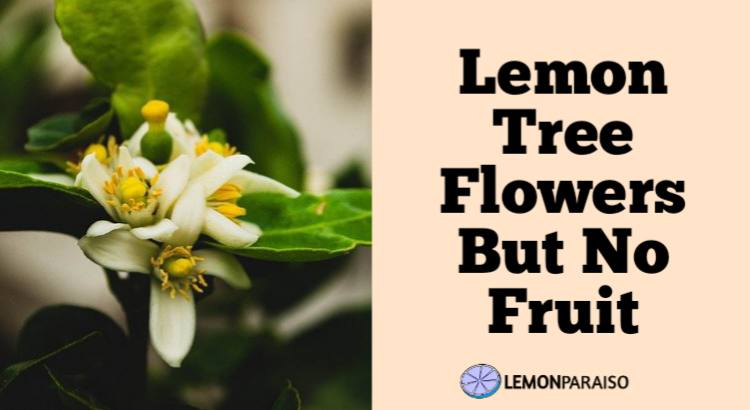Lemon Tree Flower: Everything You Need To Know

Lemon trees are a popular fruit tree that produces tart and juicy fruit used in cooking and baking. However, beyond their fruit, lemon trees also produce fragrant and colorful flowers that can be used for a variety of purposes.
When Do Lemon Trees Flower?
Lemon trees generally flower in the spring and summer, with the exact timing depending on the climate and location. In warmer climates, lemon trees may flower multiple times throughout the year, while in cooler areas they may only flower once.
Factors such as temperature, humidity, and amount of sunlight can affect the timing of flowering. It is important to note that young lemon trees may take several years before they start producing flowers.
How Long Do Lemon Tree Flowers Last?
Lemon tree flowers typically last for about 7-10 days before they start to wilt and fall off. However, the duration of flowering can vary depending on the age of the tree, growing conditions, and other factors. Some flowers may last longer or shorter than others.
How Many Flowers Does A Lemon Tree Produce?
The number of flowers a lemon tree produces can vary depending on the age and size of the tree, as well as environmental factors. Mature trees may produce hundreds or even thousands of flowers during the flowering season.
However, young trees or those grown in less optimal conditions may produce fewer flowers.
How Do Lemon Tree Flowers Turn Into Fruit?
After pollination, lemon tree flowers begin to develop into fruit. The ovary at the base of the flower swells and begins to form a lemon. Over time, the lemon will grow and ripen until it is ready for harvest.
What Is the Pollination Process For Lemon Tree Flowers?
Lemon tree flowers are pollinated by bees and other insects that are attracted to their sweet scent and nectar.
The pollen from the male part of the flower, the stamen, is transferred to the female part, the pistil, where it fertilizes the ovary and allows the fruit to develop.
What Are the Ideal Growing Conditions For Lemon Tree Flowers?
Lemon tree flowers thrive in warm, sunny conditions with well-draining soil. They prefer temperatures between 70-85°F and moderate humidity. Adequate water and nutrients are also important for healthy flower growth.
Lemon trees can be grown in a variety of climates, but they may require extra care in areas with extreme heat, cold, or dryness.
How Can You Encourage Lemon Tree Flowers To Bloom?
To encourage lemon tree flowers to bloom, it is important to provide them with the right growing conditions. This includes proper soil, water, and nutrient management, as well as adequate sunlight and warmth.
Pruning can also help stimulate flower growth by removing dead or diseased wood and promoting new growth.
Can You Grow Lemon Trees Solely For Their Flowers?
While lemon trees are primarily grown for their fruit, their flowers can also be a valuable resource. Lemon tree flowers are often used in perfumes, soaps, and other fragrances.
Additionally, they can be used to make tea and other culinary creations. However, growing lemon trees solely for their flowers may not be as profitable or practical as growing them for their fruit.
Do Lemon Tree Flowers Have A Fragrance?
Yes, lemon tree flowers have a sweet, citrusy fragrance that is prized in the fragrance industry. The scent is derived from the essential oils found in the flowers, which are often used to create perfumes, soaps, and other products.
Can Lemon Tree Flowers Be Used For Culinary Use?
Yes, lemon tree flowers can be used for culinary purposes. They can be steeped in hot water to make a fragrant and flavorful tea, or used to add a citrusy aroma to baked goods, syrups, and other recipes.
What Is the Role Of Bees In Pollinating Lemon Tree Flowers?
Bees play a critical role in pollinating lemon tree flowers. As they gather nectar from the flowers, they inadvertently transfer pollen from the male stamen to the female pistil, allowing fertilization to occur and fruit to develop.
Without bees and other pollinators, lemon tree flowers may not be able to produce fruit and maintain the health of the tree.
Can Lemon Tree Flowers Attract Other Pollinators Besides Bees?
Yes, lemon tree flowers can attract a variety of other pollinators, including butterflies, moths, and beetles. These insects are also attracted to the sweet scent and nectar of the flowers, and can help with pollination if bees are not present.
Can Lemon Tree Flowers Be Used For Decorative Purposes?
Yes, lemon tree flowers can be used for decorative purposes. The bright, fragrant blooms can be used to create floral arrangements or added to potted plants for a pop of color and scent.
However, it is important to note that cutting too many flowers can negatively impact the health of the tree and reduce fruit production.
What Is the Difference Between Lemon Tree Flowers And Other Citrus Tree Flowers?
While all citrus tree flowers share some similarities, there are differences between lemon tree flowers and those of other citrus trees. Lemon tree flowers are typically smaller and have a more intense fragrance than other citrus tree flowers.
Additionally, lemon tree flowers may bloom earlier in the year than other citrus tree flowers, and the fruit may mature more quickly.
Can Lemon Tree Flowers Be Used In Essential Oils?
Yes, lemon tree flowers can be used to make essential oils. The oils are extracted from the flowers using a steam distillation process, which captures the fragrant compounds and produces a concentrated oil.
Lemon tree flower essential oil is often used in perfumes, soaps, and aromatherapy products.
What Are Some Common Pests That Can Damage Lemon Tree Flowers?
Common pests that can damage lemon tree flowers include aphids, mites, and thrips. These insects can feed on the flowers and cause them to wilt or fall off prematurely.
It is important to monitor for pests and treat them promptly to prevent damage to the tree and its fruit.
What Are Some Common Diseases That Can Affect Lemon Tree Flowers?
Common diseases that can affect lemon tree flowers include powdery mildew, citrus canker, and root rot.
These diseases can cause the flowers to wither or fall off, and can also impact the health of the tree itself. Proper care and management can help prevent and control these diseases.
How Can You Tell If A Lemon Tree Flower Is Healthy Or Diseased?
Healthy lemon tree flowers will be bright, fragrant, and free of damage or discoloration. Diseased flowers may appear wilted, discolored, or covered in mold or mildew.
It is important to regularly inspect lemon tree flowers for signs of disease or pest damage, and to take appropriate action to address any issues.


